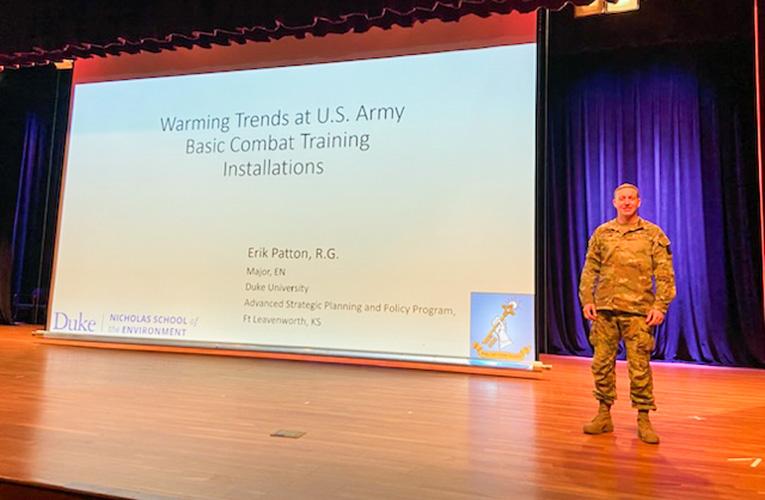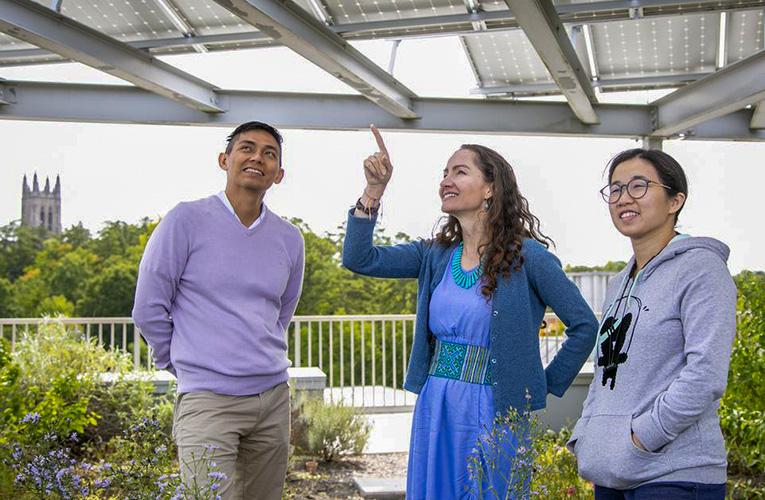The Doyle Lab, led by Martin Doyle, professor of river systems science and policy, seeks to understand the context for river science in society, from chasing sand grains to tracing landscape genetics. It also works on policy, how it effects river management, and implications for water governance.
The lab is part of the Duke River Center, comprised of four principal investigators and their respective lab groups. Each group brings a unique perspective to our evolving understanding of stream and ecosystem dynamics, and to our ability to inform the policy and management decisions we make that affect river ecosystems.
Ph.D. student Erik Patton recently shared insights into the Doyle Lab, its research, his experience in the lab and the opportunities the lab offers Duke students. Patton, a major in the U.S. Army, attended Duke as part of an Army scholarship program that gives officers a chance to earn a Ph.D. applied towards a topic relevant to the Army or national security.
What is the lab's research focus and what big questions is it trying to answer?
The Doyle Lab is highly interdisciplinary, focused on addressing challenges across a range of topics. It has a primary focus on water resources, but within that, topics are broad. A recent Ph.D. graduate had a research focus on water utilities and the municipal bond market, highlighting the inequalities within the market and addressing how infrastructure upgrades are not keeping pace with population growth (and, in some cases, depopulation in rural areas) and may not be financed appropriately to meet future challenges.
The most recent graduate looked at water quality in urban streams, focusing on three different watersheds in the Durham area to explore how surrounding land surface area impacts water quality and runoff rates.
My particular focus took a turn from water infrastructure and into the role of heat, and specifically climate change trends, have on military recruit training. By bringing together an interdisciplinary team, including Dr. Ashley Ward at the Nicholas Institute for Energy, Environment & Sustainability, I focused on identifying how changes in temperature may increase the number of days when it is too hot to safely conduct the sort of physically intensive training that Army recruits do during basic training.
What has been your favorite or most rewarding experience in the lab so far?
I really appreciate the ability to learn across disciplines in the Doyle Lab. Dr. Doyle has a unique ability to put students in contact with the right professor in the right field to ensure that research and study is interdisciplinary, which contributes to having a much better (in my opinion) experience and research project.
I had the chance to travel to Oak Ridge National Lab with Dr. Doyle and participate in a Global Water Security workshop, which explored future challenges related to climate change and water availability period. I also presented research at the annual U.S. Army Heat Forum, which is a forum for medical personnel, safety officers, and military commanders to discuss safely training new recruits during periods of extreme temperature. The Doyle Lab also participates with the Bernhardt Lab for weekly river center talks, which are informal discussions of ongoing research particularly around all things water-related.
What opportunities does your lab offer students and how does that experience contribute to their academic and career growth?
The Doyle Lab really offers students the ability to interact with government and industry partners. Dr. Doyle has a network of colleagues within the Army Corps of Engineers, at National Research labs, and within insurance and finance, all related to water infrastructure and security. He even recently served as a senior advisor on water resources to Michael Connor, the assistant secretary of the Army for civil works. In this role, he provided expertise on challenges ranging from large dam removals to flood control projects.
This network is often extended to students who can interact with these folks providing insight into the state of industry and government policy in helping students to explore future career paths.
Each month the Nicholas School will highlight the work of one of its labs through the lens of lab members. For more information on Duke Environment research visit our research page and to keep up with the latest news, subscribe to our monthly Research + Impact email newsletter. Explore more about the Doyle Lab and the Duke River Center on its website.




